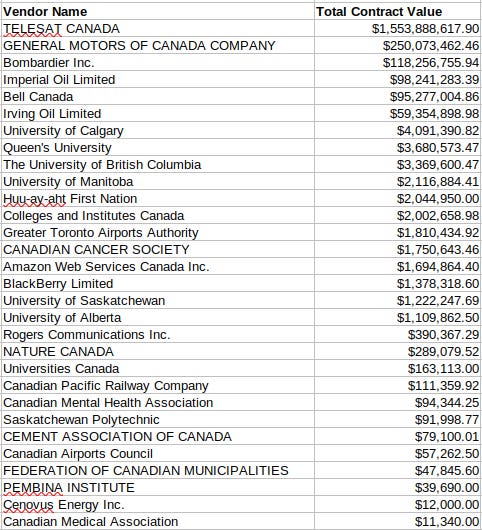Can a Registered Lobbyist Also be a Government Contractor?
...And a couple of updates
First, an update.
Comments to last week’s Do Government Controls Over Alcohol Sales Work? post raised an interesting question: why do some provincial governments mandate government-owned liquor monopolies? I had always assumed that, officially at least, it was about public safety and health.
But is my assumption correct? Those comments raised the scary possibility that Ontario’s LCBO, for instance, existed exclusively to generate revenue for government programs. I found that terrifying because if they could shut down the private sector for alcohol sales in favor of what’s effectively a consumption tax, what’s to stop them from taking over other profitable industries?
Well, I can’t be sure what the Ontario government has been secretly preparing for our economic future, but I can at least be confident that the LCBO’s mandate won’t be the catalyst that sets things off. According to one of their websites, the corporation confirms that public safety and health is officially still on the table:
“A leading reason the LCBO exists is to help ensure beverage alcohol is sold in a responsible manner throughout Ontario. While the way we retail beverage alcohol has changed substantially since 1927, one thing that has remained constant is our dedication to preventing sales to minors, intoxicated adults and those buying for either party (known as second-party purchases).”
Which I suppose - in the absence of evidence that public safety and health have benefited from government controls - supports my call for a policy review.
Right on cue, by the way, the Province of Ontario is loosening the rules to permit wine and beer sales in licensed convenience stores. As far as I can tell, those stores will still be dependent on LCBO for their wine products, but I guess it’s a start.
Ok. Now on to today’s feature.
If you’ve been paying attention here, you’ll recall how I recently explored the potential conflicts of interest hanging over registered lobbyists who also receive federal funding of one sort or another. You’ll also no doubt remember my post on federal contract data, were we eyeballed some of the big players in the Government Vendor Sweepstakes.
But what strange new life form might rise from the steamy swamp if we combined those two databases? Are there, in other words, organizations or corporations that drink from both ends of the (certifiably biodegradable, melts-in-your-hands-not-your-mouth) straw?
To find out, I filtered the federal lobbyist registry data for only those organizations that had engaged in at least 100 communications with public officials since January, 2023. I then matched the 89 results against vendors on the Open Government Contracts over $10,000 database who had won federal contracts in the years since 2015. These were the 30 matches, ranked by the total cumulative value of each one’s contracts:
One name from that list that stands out is the Pembina Institute. The $39,690 they billed the government for their contract is far too low to raise serious objections. But it’s interesting that the environmental advocacy group that, as we recently saw, receives $1.5 million in federal funding each year should also find itself in a position to bid and win a contract (for “scientific services”).
And how about Colleges and Institutes Canada? Did their 197 registered communications play any role in the more than $2 million in contracts (since 2015) they won for “training and curriculum development” and “management consulting”? And could those meetings have been behind the nearly $50 million in federal funding they received in 2022?
In principle, of course, there’s nothing evil about governments contracting out work that can be performed better and faster by private companies. And there are reasonable arguments supporting the value that responsible lobbyists can provide public officials.
But are the “contractor” and “lobbyist” hats always compatible? If lobbyists exist to advise officials, then how are they different from McKinsey-like consulting contractors who are paid for their opinions? Granted, not all vendors fit the McKinsey profile, but how much operational drift would it take before the differences become moot?




I humourisly suspect the government does LCBO for the free booze. It explains how the huge amount of liquor disappears. https://www.cbc.ca/news/canada/toronto/liquor-thefts-lcbo-1.5069842
But on a more serious note I think the real problem is that so called conservative governments find the lcbo lobby untouchable. Which is the same sad story in every corner of government.
Very very interesting. I tend to think of lobbyists as low-lifes anyway. Great information that I won't forget. Thanks.